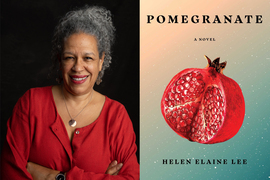A pomegranate might seem a bit mundane on the outside, but, like many things in the world, it contains a wondrous richness inside. That’s a motif of Helen Elaine Lee’s new novel, “Pomegranate,” published by Simon and Schuster this spring. The story tracks the journey of Ranita Atwater, a queer Black woman redefining her life after four years in prison, as she digs into her tumultuous past and rebuilds connections with her children and family. A lively, intense, intricately structured book — the title is from a gift Ranita’s father gives her in the story — “Pomegranate” has earned wide praise. Lee, a professor of comparative media studies/writing at MIT, recently talked with MIT News about the book.
Q: Broadly, “Pomegranate” follows the story of Ranita, who is trying to rebuild her life after four years in prison for drug possession, as she tries to redefine her own sense of humanity. To you, what is the essence of the book?
A: I think of it as a journey of healing and self-acceptance and autonomy. It’s about a Black woman getting out of prison and trying to stay clean and repair relationships with her kids and family and the aunts who have been taking care of the kids. And also, it’s Ranita’s journey to own her love for the woman on the inside, Maxine, who has helped to inspire her. She is grappling with embracing her queer identity and figuring out what that means to her. And accepting and owning her full and complex story.
The overarching things I’m interested in are loss and possibility. What is wounding and what is healing? I wanted to illuminate the devastating emotional and psychological toll of our retributive carceral system — the dehumanization, the trauma of being warehoused and rendered invisible and thrown away like trash. For Black people who are incarcerated, that’s also connected very much to the history of enslavement, convict-leasing laws, Jim Crow laws, sharecropping, and unpaid and low-wage work. I also wanted to illuminate resistance and liberation.
Within the framework of incarceration and Ranita’s journey, I also wanted to think about the body and what women endure, and how politics are always played out on women’s bodies, and Black women’s bodies in particular. I’m probing what it means to be looked at but not really seen: the ways that women, particularly Black women, are scrutinized, eroticized, exoticized, and judged. What is the toll of that? And what are the possibilities of reclaiming our bodies and voices and stories? I’m interested in the power of love, and how love is a practice, what it means to belong, and what our responsibilities are to our people.
It is a hopeful book. I am telling a lot of painful stories, but I believe in the power of community, nature, love, wonder, and storytelling to renew and heal.
Q: Since you mentioned power: Reading the book made me think about how society exerts power on people in different ways, legal and informal. But isn’t part of the journey for Ranita to discover the sources of her own power, whether rooted in friends, nature, or community?
A: Absolutely, I think that is a core thing that I’m examining. The language you used makes me recall that when I taught the MIT class Black Matters for the first time with two colleagues, back in 2009, our thematic framework for the course was power from without and power from within. That’s what Black literature is often fundamentally about: the power exerted by institutions and systems of control and by the “Master Narrative,” to use Toni Morrison’s phrase, which describes the ideological script imposed by those with social, economic, and political power on the rest of us, and our resistance and defiance of those definitions and limitations. So, what are the possibilities for us to draw on, to find power within us, around us, and between us?
Q: Another striking thing for a reader is the sheer complexity of Ranita’s life, and by extension, our own lives — she’s curious, intellectual, a recovering addict, reconnecting with her family, grappling with a violent past, and much more. How intent were you on trying to create a character this fully complex?
A: As I teach creative writing at MIT, I’m always pushing students toward depth and complexity in characterization. But this is also a reflection of how I experience the world. As a Black woman, that’s how you survive, seeing things with that sort of multiple lens. And also, a complex character is a character whom readers care about. I wanted Ranita to ring true in all kinds of ways. I talked to a book club this week, and somebody noted the way Ranita loves words — her mother made that a mark of measuring up — and another person at the book club mentioned that she does that too, and it made her relate to Ranita. It’s a defining aspect of her character, and indeed, her love of words and stories is one of the resources she has to draw on in her recovery and healing; it’s also thematic.
In terms of how we feel as women, as Black people, as queer people, and the intersections of those life experiences, I never sit down and say, “I’m going to show everyone how racism and misogyny work.” That lens is fundamentally in me and has been my whole life, so when I put the world on the page, it comes out. Another thing I tell students is, “Your story is your model for the world and how the world works.” This book is my model of how things do and can work.
Q: At the beginning of the novel, Ranita says, “I live my life forward and backward.” There are a lot of layers to that in the book. Some chapters are flashbacks. Ranita is in therapy and digging into her past. How much do we have to confront the past to move forward? Is it any more the case for someone in Ranita’s situation?
A: You do have to do that to be well, I think, although it’s painful, but I think that’s true for everybody. That’s just a human thing. That idea was always a part of this book. And the alternation of chapters between Ranita’s first person, present tense story of getting out and rebuilding her life, and the third person omniscient narration of the personal history that informs the present story, is a way of showing that back-and-forth journey she has to make. Ranita is coming into greater awareness of herself, and not yet able to synthesize and tell her full story. The alternate third-person narration conveys the things she is moving toward but hasn’t come to terms with yet. I didn’t start out with that structure, but because that was the thematic underpinning, it became the answer. The structure also helps to convey the importance of reckoning with the past, and how we have to keep choosing who we’re going to be.
Q: In this story, it’s also a group effort — finding yourself in relation to other people.
A: Yes, you’re right. Ranita’s father has given her resources, and she has to bring them to the fore — intellectual curiosity, a love of nature, an attunement to wonder, and ethical and community codes about how to be in the world. Maxine gives her the experience of being seen and known and respected, and nurtures her constructive defiance. Auntie Jessie teaches her that love is a practice. We draw on what’s in us, and around us.
Q: You’ve participated in and taught in prison education programs, which have helped you understand this subject matter. Over time, are attitudes changing about people who have been incarcerated, or not — or is it even possible to tell?
A: I think Ranita’s story is hopeful, and you pull for her — and maybe that played a role in why this book got into the world, when earlier work on the lives of incarcerated people did not. But I also think we are having a different conversation about incarceration, partly because of books like Michelle Alexander’s “The New Jim Crow.”
My concern for the criminal legal system was embedded in me by my dad, who was a criminal defense lawyer, and he made me understand that our people, especially, don’t grow up with a full set of options and resources, and that justice is a fiction for many of us. My mom was a literature professor and she gave me books to see by, and my understanding of the transformative power of stories. She’s in everything I do. They’re both gone, and not gone, as the first line in the book reads, and I continue to feel them with me. And I feel from my ancestors a sense of social responsibility. That’s important to the story. I always wanted to [publish] something about the lives of imprisoned people. That isn’t my experience, though, so I have tried to responsibly use the access I’ve had to earn and tell this story without being appropriative.
I do find the impulse to say — everywhere I go — that I had a really wonderful mother, because Ranita’s mother is a source of her pain. Because my mother’s gone, it haunts me a little that people might think, “Oh, did Helen have a mother like that?” But I had the most warm and wonderful mother.
Q: We often say, “write what you know,” but surely that can’t apply only to the things we know or experienced most directly. There has to be some room for creativity.
A: It’s the writer’s job to imagine. Whether in the classroom at MIT, or any classroom I’ve taught in, or in terms of my own experience, I believe in the transformative power of reading and writing, and I see that in my students. The practice of grappling with what matters, and trying to get it on the page — that’s life-changing and liberatory.










